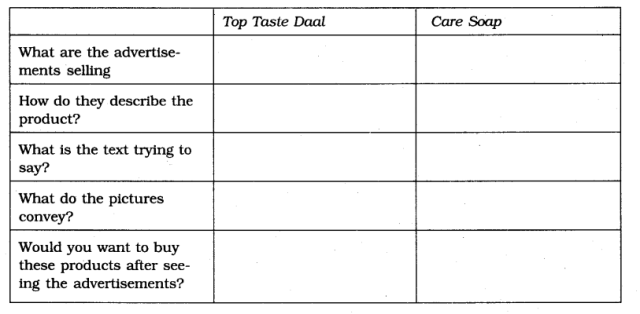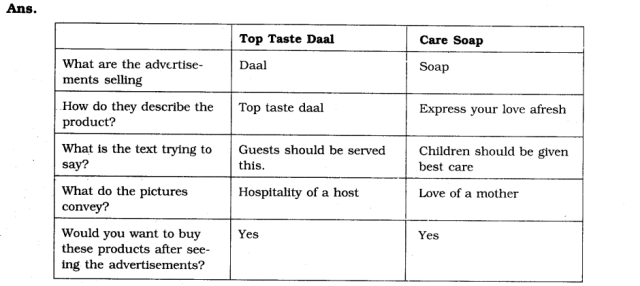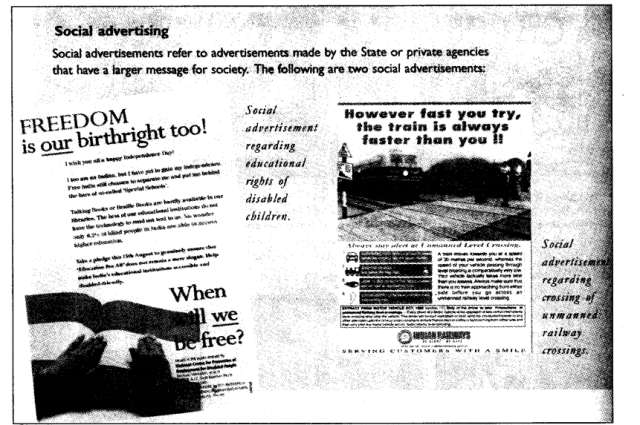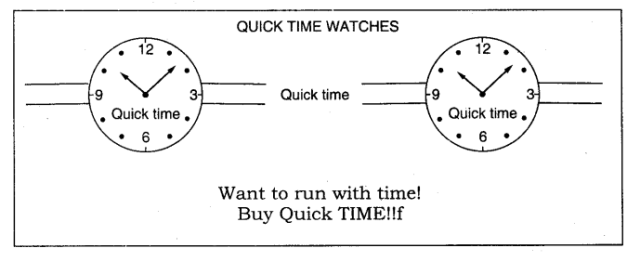Home / NCERT Solution / NCERT Solution for Class 7 / NCERT Solutions for Class 7 Civics
CBSE Board NCERT Solutions for Class 7th Civics Chapter7:Understanding Advertising
NCERT Solutions For Class VII Civics Social Science Chapter 7 Understanding Advertising
1. Look at the two advertisements given below and tell in the table that follow. 


2. Do you think there is a problem in using the image of the mother as the only person who takes care of the child on the Care Soap, advertisement?
Answer: I don’t think there is any problem. Mother is undoubtedly the only person in the family who takes the greatest care of her child.
3. Observe the advertisements given below and answer the questions that follow: 
(a) What does this advertisement want me to feel when I use this brand?
(b) Who is this advertisement talking to and who is leaving out?
(c) If you have money to buy these products, how would you feel when you see these advertisements? If you do not have money, then how would you feel?
Answer: (a)When I use this brand I feel exalted.
(b) This advertisement is talking to those who can afford to buy this brand. It is leaving out those who belong to the poor lot and earn their livelihood with great difficulty.
(c) If I have money to buy these products, I would feel proud when I see these advertisements. But if I do not have money, I would feel depressed.
4. Observe the advertisement given below and answer the questions that follow: 
(a) Who do you think is the target audience for the social advertisements above?
(b) What is the message that each social advertisement is trying to get across?
(c) Having read about diarrhoea epidemic in the chapter on State Government,
Answer: (a) Here are two social advertisements. In the first advertisement the target audience is the disabled children. In the next advertisement the target audience is common mass.
(b) Freedom is birthright to the disabled children also. Unless they get education, this freedom won’t come to them. Hence, they have every right to get education.
Railway runs faster than us. Hence, we should not dare to cross the railway crossing when the train is coming.
Advertisement No. 1
Visual — Display of furniture items
Text — Quality, brand, discount ,
(a) Advertisement No. 2
Visual — Display of CCTV
Text — Features, Quality, Availability
(b) People can afford best things at cheaper price.
(c) Advertisement No. 1. This advertisement is speaking to the middle class people and is leaving out the people belonging to higher societies.
Advertisement No. 2 is speaking to the business group and is leaving out the common mass.
(d) I would feel a little bit depressed.
5. Can you explain two ways in which you think advertising affects issues of equality in a democracy?
Answer: Branded products cost much more than those sold loose. It is because they include the costs of packaging and advertising. Whatever may be the reason, it is veiy difficult almost impossible for the large majority of people to buy such costly/branded products. Only a small group of high class people, say wealthy people can afford to buy them. Here, the principle of equality is ignored. Advertising a product is a costly affair. Only large companies can get their products advertised. So far small businessmen are concerned, they find it difficult to advertise their product because their income is small. They often have to sell their products in weekly markets and neighbourhood shops. Here, also the principle of equality is marred.
6. Making an advertisement requires a lot of creativity. Let us imagine a situation in which a manufacturer has just made a new watch. She says that she wants to sell this watch to school children. She comes to your class and asks you all to create a brand name as well as an advertisement for the watch. Divide the class into small groups and each group creates an advertisement for this watch. Share it with the class.
Answer: Students should attempt it at class level. One sample answer is given below: 
VERY SHORT ANSWER TYPE QUESTIONS
1. What do advertisements do?
Answer: They attract people’s attention to their products.
2. What do you mean by the word branding?
Answer: The naming of a product is called branding.
3. Why is the consumer confused? Or What makes the consumer confused?
Answer: Sometimes there are two or more advertisements of a similar product. This makes the consumer confused because it becomes difficult for him to differentiate one product from the other/others.
4. What do the advertisers do to convince the consumer?
Answer: They start claiming certain special values for their brand.
5. How are brand values conveyed to us?
Answer: Brand values are conveyed to us through the use of visuals and words.
6. When products are advertised by cricket heroes and film stars, we feel tempted to buy them. Why?
Answer: It is because persons whom we consider our heroes tell us that those products are worth buying.
7. Advertisements aim to get people to buy a particular brand’. What does this really mean?
Answer: It means that after we see an advertisement we should want to buy the brand
8. Why do companies show the advertisements again and again?
Ans. They do so in order to get it stick in people’s minds.
9. Under what pressure do companies show the advertisements again and again?
Answer: There are so many advertisements in the market. This creates a pressure on the companies and they start showing the advertisements again and again to make it most popular.
10. What do you mean by social advertisements?
Answer: Social advertisements are advertisements made by the State or private agencies.
These advertisements have a larger message for the society.
11. What impressions does advertising create on us?
Answer: It creates the impressions that things that are packaged are better than things that are sold loose.
12. Mention one drawback of advertising.
Answer: It tends to promote a certain lack of respect for the poor.
13. How do pi ople feel when they fail to afford certain brands?
Answer: They feel bad on their helplessness to buy certain brands.
SHORT ANSWER TYPE QUESTIONS
1. Why do you think the manufacturer of the daal (pulses) gave his product a specific name?
Answer: Daals (pulses) are usually sold loose in the market. There are different types of daals in the market such as arahar ki daal, rnasoor ki dual, urad ki daal, etc. These names are not brand names. When a company takes a particular daal such as urad ki daal and puts it into a packet, it will need to give the daal a specific name. It needs to do this so that we don’t confuse the daal is that particular packet with the daal that is sold loose.
2. What do companies do in case there are two brands of a similar product?
Answer: In such a situation the consumer is confused. He cannot decide which product he should buy. The manufacturer, being aware of this has to give the consumer a reason to refer a particular brand of a product. Just naming a product does not help sell it. So, advertisers began claiming certain special values for their brand. In this way, they try to differentiate it from other similar products.
3. What brand values are used by the two daals namely Top Taste Daal’ and ‘Best Taste Daal’?
Answer: The two daals namely Top Taste Daal’ and ‘Best Taste Daal’ are saying two different things. Top Taste Daal’ is appealing to our social tradition of treating guest extremely well. On the other hand ‘Best Taste Daal is appealing to our concern for our children’s health and that they eat things that are good for them. Values such as treating our guests well and making sure and children get nutritious food are used by brands to create brand values. These brand values are conveyed through the use of visuals and words to give us an overall image that appeals to us.
4. How is personal emotion being used in the Care Soap advertisement?
Answer: The Care Soap advertisement uses the mother’s concern for her child. It tells the mother that her love and care is best shown through using this particular brand of soap. Because of this, mothers begin to feel that using this soap is a sign of how much they love their child. In this way, the advertisement uses the love of a mother for her child to sell this expensive soap.
Just think about those mothers who cannot afford this soap. They might begin to feel that they are not giving their children the best care.
5. What role do advertisements play in our lives?
Answer: Advertisements play a major role in our lives. They influence us to a great extent. We watch advertisements, discuss them and often judge people according to the brand products they use. Whenever we see cricket heroes and film stars advertising different products we feel tempted to buy those products. It is because persons whom we consider our heroes tell us that they are worth buying. Advertisements tell us how we should live our lives, what we should aspire and dream for, how we should express our love, what it means to be smart, successful and beautiful. Thus, advertisements have significant role in our lives. In the present scenario, we cannot think of a life without advertisements.
LONG ANSWER TYPE QUESTIONS
1. How are smaR businessmen affected in this age of advertisements?
Answer: Advertising a product is a costly affair no doubt but this is the only way to sell products in the market. Large companies have no dearth to money and therefore they can easily advertise their products. But these are small businessmen also who have no money to show their products on television or national newspapers and magazines. They often have to sell their products in weekly markets and neighbourhood shops.
Advertising also makes us believe that packaged and branded things are better than things sold loose. We often forget that the quality of a product has little to do with packaging that it comes in. This shift to packaged products negatively affects the sales of several small business forcing people out of their livelihoods.
2. Mention the drawbacks of advertising.
Answer: Advertising shows certain drawbacks which are as follow:
(a) We are citizens of a democratic country. It means we all are equal. But advertising always focuses on the lives of the rich and influential persons. It tends to promote a certain lack of respect for the poor. They are not the faces we most often see in advertisements and therefore we cease to think about them.
(b) Advertising uses personal emotions of the people. Those who are capable to buy certain brands feel exalted but there are many who cannot afford to buy them. The personal emotions of these people are hurt badly.
(c) Advertising promotes the sale of packaged products. This negatively affects the sale of things which do not come in packets. This forces many people out of their livelihoods.
(d) Advertising by focussing on the lives of the rich and famous helps us forget about issues of poverty, discrimination and dignity, all of which are central to the functioning of equality in a democracy.
EducationIdol are provided study materials for Class 7 Chapter 7 Civics, NCERT solutions for Class 7 Civics Chapter 7 revision notes, NCERT solutions for Class 7 Civics Chapter 7 question papers, NCERT solutions for Class 7 Civics Chapter 7 sample papers, NCERT solutions for Class 7 Civics Chapter 7 syllabus and NCERT solutions for Class 7 Civics Chapter 7 important questions. Students can prepare and score well using education idol study materials.